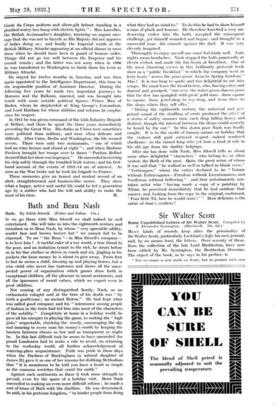Bath and Beau Nash
Jr we go there with Miss Sitwell we shall indeed be well entertained. She will take us into the eighteenth century and introduce us to Beau Nash, by whose " very agreeable oddity, scarlet face and brown beaver hat " we cannot fail to be charmed. To see " the Beau "—in Miss Sitwell's company— is to love him ! A tactful ruler of a toy world, a true friend to the poor, and an imitation tyrant to the rich, he struts before us in his fine clothes or drives in coach and six, jingling in his pockets the loose money he is about to give away. From first to last he seems a child, dressing up and playing horses, but a wise child who never has tantrums and shows all the unex- pected power of organization which games draw forth in exceptional children, all the pleasure in moral sentiments, and all the ignorance of moral values, which we expect even in good children.
Not coining of any distinguished family, Nash, as an enthusiastic eulogist said at the time of his death was " by birth a gentleman ; an ancient Briton." He had kept what was called good company and his " intercourse among people of fashion in the town had led him into most of the characters of the nobility." Completely at home in a holiday world, he gave all his energies to playing the game; to making the " high jinks" respectable, checking the rowdy, encouraging the sby and insuring to every man his money's worth by keeping the barriers between classes as low and as transparent as might be. In this last difficult task he seems to have succeeded, for proud Londoners had to make a rule to avoid, on returning to the workaday world, all further acknowledgement of watering-place acquaintance. Pride was pride in those days when the Duchess of Buckingham (a natural daughter of James II) gave it as one of her reasons for disliking Methodism that " it is monstrous to be told you have a heart as simple as the common wretches that crawl the earth."
Against such sentiments as these it took some strength to prevail, even for the space of a holiday visit. Beau Nash succeeded in making an even more difficult reform ; he made a sort of truce of Bath with the duellists. He was determined, he said, in his pretence kingdom, " to hinder people from doing what they had no mind to." To do this he had to show himself a man of pluck and honour. He therefore knocked a very un- deserving visitor into the bath, accepted the consequent challenge, got himself wounded and began—and brought to a successful issue—his crusade against the duel. It was very cleverly imagined.
Thoroughly to enjoy oneself one must feel fairly well. Late nights mean headaches. Nash stopped the balls punctually at eleven o'clock and made the fun begin at breakfast. One of the most charming scenes in this brilliantly pictorial book show us a "public breakfast" to which the company went in ferry boats " across the grass green Avon to Spring Gardens." Alas ! It is too long to quote and too delightful to cut into scraps. We must leave the breakfasters, who, having eaten and danced and gossiped, "run over the water-green shaven grass that the dew has spangled with great gold stars—from square to square, from jewel-shop to toy-shop, and from there to the shops where they sell silks."
" During the eighteenth century the universal and per- petual sound of the shuffling of cards produced the effect of a storm of sultry stmaner rain, each drop falling heavy and distinct, though the interval between the drops could scarcely be heard by the car." In this storm poor Nash was finally caught. - It is to the credit of human nature on holiday that the visitors still paid outward respect---4ndeed rendered obedience—to the ruined king who yet bore a kind of rule in his old age from his shabby lodgings.
After she has done with Nash, Miss Sitwell tells us about some other delightful " characters " who belong to, or often visited, the Bath of the past. Quin, the great actor, of whom it was said that " he walked as well as talked in bhuik verse." " Verbruggen," whom the critics declared to be " Nature without Extravagance—Freedom without Licentiousness, and Vociferous without bellowing "— and that unfortunately mis- taken artist who " having made a copy of a painting by Titian, he perceived immediately that he had outdone that master, and, looking from the copy to the original, exclaimed, ' Poor little Tit, how he would stare ! ' " How delicious is the satire of time's verdicts !








































 Previous page
Previous page